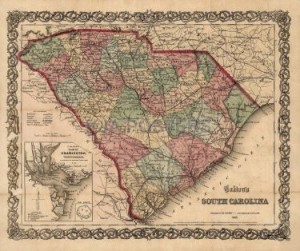 Today Frederic Bates of Pennsylvania writes a letter to U. S. President Abraham Lincoln:
Today Frederic Bates of Pennsylvania writes a letter to U. S. President Abraham Lincoln:
Titusville Pa Nov 10/63
Dear Sir
On the 23d of July last I left Macon Geo. with my wife & child for Vermont My Native State Had been a resident of the South eight years. While travelling from Macon to Atlanta by “rail” I overheard some conversation which I consider to be my duty to communicate to you. The substance was this. The speaker (J. H. Jossey of Macon) with several other wealthy planters in that region had entered into an agreement with a desperate character (I now forget his name) to assassinate both you & Mr Seward They had given bonds to pay him $10.000 — for the Murder of one & $20.000 for both — & in case he lost his own life in the Villainous deed the amount was to be paid to his family.
On acct of an Uncle & family still at the South I beg of you to let this information remain a secret so far as my name is concerned. That you may know I am no imposter I refer you to Hon Jacob Collamer of Vt. who knows my father (I think) Jacob Bates of Hartland Vermont & My Uncle Dr D. L Lyman of Royalton Vt–
Very Respectfully
Fredc Bates
Indeed, while the warning within this letter may or may not be of any substance, many white Southerners certainly wish Lincoln were dead. As such, death threats against the President, whether direct or implied, are common.
Hatred of abolitionism, and in particular of Lincoln’s Emancipation Proclamation, drives many of the threats against the President. Even as Bates warns Lincoln of what he perceives as a plot against the President, John Wilkes Booth, a Confederate secret service operative working as an actor at Ford’s Theater in Washington, of which Lincoln is a periodic patron, writes in a letter:
This country was formed for the white not for the black man. And looking upon African slavery from the same stand-point, as held by those noble framers of our Constitution, I for one, have ever considered it, one of the greatest blessings (both for themselves and us) that God ever bestowed upon a favored nation….
When I aided in the capture and execution of John Brown … I was proud of my little share in the transaction, for I deemed it my duty And that I was helping our common country to perform an act of justice….I thought then, as now, that the abolitionists, were the only traitors in the land, And that the entire party, deserved the fate of poor old Brown.
Booths’ ominous words foreshadow his own future assassination plot against Lincoln.
Meanwhile, this month in the heart of the Confederacy the Barnwell Baptist Association of Allendale County, South Carolina convenes. It is one of the later Baptist associational meetings in the Confederacy this year. No doubt some of the men present also wish Lincoln were dead. The formal discussion, however, concerns the “spiritual condition” of Confederate soldiers, a focus of Southern Baptists that grows even as the fortunes of the South rapidly wane.
The Association met, as appointed, with the Mount Olivet church under the pastoral care of Rev. F. J. Sanders. Rev. W. C. Baxley preached the Introductory Sermon.
Brother David H. Rice was elected Moderator, and T. J. Counts was re-elected Clerk.
Messengers were present from the Edisto and Savannah River Associations.
The principal subject claiming the attention of the Association was the spiritual condition of the soldiers in the Southern army. The South Carolina Colportage Board had taken into its hands the spiritual interests of the soldiers, and was supplying the troops in South Carolina with missionaries, tracts, Testaments, etc. Rev. W. D. Rice, the able and laborious Superintendent of Colportage, could not attend this meeting of the Association, and Rev. B. F. D. Perry and Rev. L. H. Shuck, who were present as visitors, were re-quested to present the claims of the Board. After addresses by these brethren quite a large sum was raised to enable the Board to supply the religious destitution among our brave soldiers.
On Sunday the Charity Sermon was delivered by Rev. F. J. Sanders. Rev. J. F. Buist was appointed to preach the Introductory, and Rev. Lewis H. Shuck, the Charity, Sermon, at the next meeting of the Association at Great Saltkahatchie church in November, 1864.
Sources: “Frederic Bates to Abraham Lincoln, November 10, 1863” (link) and (link); John Wilkes Booth, “To Whom it May Concern,” November 1864, in John Rhodehamel and Louise Taper, editors, Right Or Wrong, God Judge Me: The Writings of John Wilkes Booth, University of Illinois Press, 1997, pp. 124-127 (link); Barnwell Baptist Association, 1863 (link)


